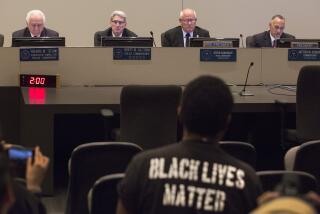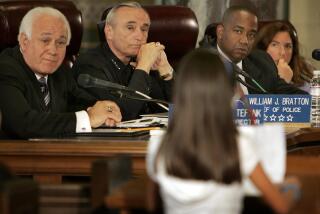State Senate OKs Davis’ Choice for Parole Board
- Share via
SACRAMENTO — The state Senate on Monday confirmed Gov. Gray Davis’ appointment of a retired Los Angeles police detective as chairman of the hard-line state parole board.
The Democrat-dominated upper house approved Republican David A. Hepburn to head the Board of Prison Terms, over the objection of Senate President Pro Tem John L. Burton (D-San Francisco).
For Davis, a centrist Democrat who has vowed not to set free anyone convicted of murder, the approval of Hepburn marked the second time this summer that one of his parole agency nominees won confirmation despite the opposition of Burton, a liberal.
For weeks, Burton had delayed a confirmation hearing for Hepburn. He said he did so in an attempt to squeeze out reforms he believed would give life-term prisoners a fairer chance at parole.
Nominees can serve without Senate confirmation for one year. Hepburn was in his 365th day, and faced the prospect of leaving his $99,343-a-year post if he did not receive approval Monday by both the Rules Committee and the full Senate.
Convinced that he had made some progress with Davis administration officials on the issue of changing board procedures to give inmates a better shot at parole, Burton reluctantly agreed to a special confirmation hearing of the Rules Committee on Monday.
The committee voted 4 to 1 to approve Hepburn. It also approved Davis’ appointment of former Assemblyman Tom Bordonaro (R-Paso Robles) to the board for a term expiring in 2004. Bordonaro first was appointed by Gov. Pete Wilson in 1998 and reappointed by Davis.
A few hours later, the full Senate confirmed Hepburn on a bipartisan 30-3 vote, but delayed a vote on Bordonaro. Democrats Pat Johnston of Stockton and John Vasconcellos of Santa Clara joined Burton in voting against Hepburn, a former LAPD lieutenant.
The nine-member board of gubernatorial appointees holds hearings for life-sentence inmates, usually murderers and kidnappers, and determines their suitability for release from prison. Currently, the board is operating with only six members.
In addition to Davis’ promise that no murderer would gain freedom on his watch, the board’s policies and actions have caused controversy.
In one recent case, the board was the target of an unprecedented appellate court order to set a parole date for a second-degree murderer. In an earlier case, a federal court found that the board had violated the Americans With Disabilities Act by abusing the rights of disabled prisoners.
Burton has charged that procedures of the board unfairly deny release dates for prisoners.
In some cases, he said, a parole panel’s recommendation for release is reversed by an internal review in which new evidence, such as a police report, is introduced without the inmate’s knowledge or ability to rebut it.
Burton also charged that the board’s system of tape-recording parole hearings for transcripts is badly flawed. In at least one case, he said, a prisoner’s parole date was reversed on review because the tape-recording produced a botched transcript.
“You want to make it really, really, really difficult!” an angry Burton shouted at Hepburn during the committee hearing.
Hepburn replied that three new sound systems are being tested by the board to improve the hearing transcripts and promised that one would be selected soon.
Burton also asserted that in selecting appointees to the parole board, Davis had failed to comply with a state law requiring that members represent a cross-section of the racial, sexual, economic and geographic features of the California population “as nearly as possible.”
“Clearly, it isn’t that,” Burton told the Senate, echoing the complaints of Hepburn’s opponents.
The board now consists of five men and one woman, all from Southern California and all from law enforcement backgrounds. Two are Latinos; the others are white. Four are Republicans and two are Democrats.
However, Hilary McLean, a spokeswoman for Davis, insisted that “there is diversity on the board. The governor’s primary concern is appointing people who do share his concern for protecting the public safety,” she said.
Lawmakers returned to Sacramento on Monday after a monthlong summer recess.
More to Read
Get the L.A. Times Politics newsletter
Deeply reported insights into legislation, politics and policy from Sacramento, Washington and beyond. In your inbox twice per week.
You may occasionally receive promotional content from the Los Angeles Times.










